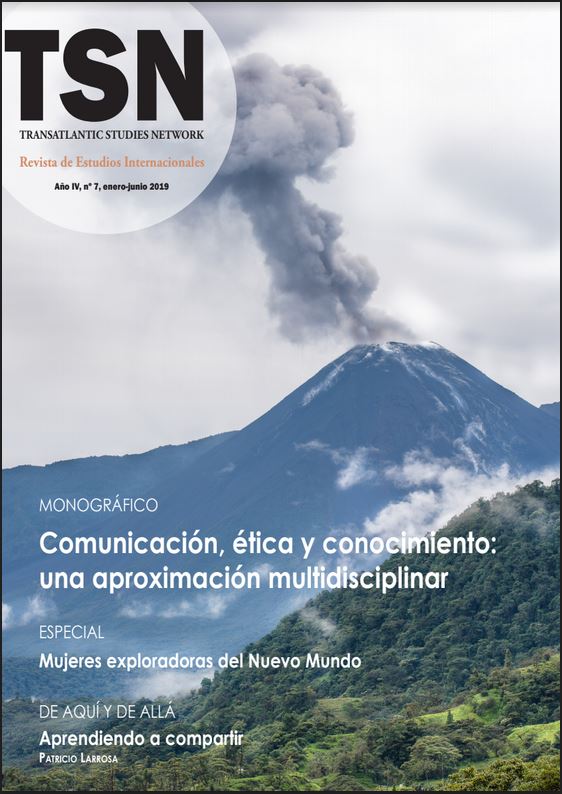Unión Europea-China: dos visiones sobre derechos humanos. Consideraciones sobre el concepto americano de derechos humanos
Palabras clave:
Asimetrías, contexto cultural, Unión Europea-China, derechos humanos, concepción del mundo, xiaokang (小康)Resumen
Este artículo compara las respectivas concepciones sobre los derechos humanos en la Unión Europea y en China, y realiza ciertas consideraciones sobre la visión estadounidense de los derechos humanos, analizando
las similitudes y diferencias respecto de los antedichos sistemas. Pero también profundizamos en las causas de la brecha conceptual entre ambas partes. El trasfondo cultural determina la concepción de los derechos humanos. Por lo tanto, los derechos humanos son asimétricos entre diferentes países o civilizaciones. Analizamos las causas y efectos de dicho fenómeno. Como no existe una Constitución europea, comparamos la ley fundamental de Alemania (ya que es la Constitución de uno de los Estados miembros de la UE) con la Constitución de China y analizamos la importancia que cada sistema otorga a los diferentes grupos de derechos humanos. Profundizamos en la agenda china para el logro de los respectivos niveles de bienestar social. El vínculo chino entre los derechos humanos y los medios de vida es otro de los aspectos que estudiamos. Mientras que en la UE y en Estados Unidos los derechos políticos son primordiales, China otorga la mayor importancia a alcanzar ciertos estándares socioeconómicos. Concluimos nuestro artículo evaluando las posibles tendencias
en el desarrollo del derecho internacional.
Descargas
Métricas
Citas
Basic Law for the Federal Republic of Germany (1949): (23 May 1949, last amended on 13/7/2017). Available at https://www.btg-bestellservice.de/pdf/80201000. pdf
Berkofsky, A. (2005): Comparing EU and Asian Integration Processes — The EU a role model for Asia?, European Policy Centre, available at https://www.files.ethz. ch/isn/10941/doc_10972_290_en.pdf, last visited on 14/01/2020
Cheng, Ni, Sin et al. (2012): “A sociosemiotic approach to fundamental rights in China”, Researchgate, p. 53, available at https://www.researchgate.net/publication/262017749_A_sociosemiotic_approach_to_fundamental_rights_in_China
China brings nearly 13m people out of poverty in 2017, State Council of the People’s Republic of China, available at http://english.gov.cn/state_council/minis- tries/2018/02/01/content_281476033059990.htm
Constitution of the People’s Republic of China (2004): (Full text after amendment on March 14, 2004), Chapter II The Fundamental Rights and Duties of Citizens, The National People’s Congress of the People’s Republic of China, available at http://www.npc.gov.cn/ zgrdw/englishnpc/Constitution/2007-11/15/con- tent_1372964.htm
“Davos: Spreading the Wealth? ”, In the Balance — BBC World Service, Sun 28 Jan 2018 04:06 Local time, Transcription of a radio program http://www.bbc. co.uk/programmes/w3csvq2m
EU Action Plan on Human Rights and Democracy (2015): European Union, pp. 5-6. https://eeas.europa.eu/ sites/eeas/files/eu_action_plan_on_human_rights_ and_democracy_en_2.pdf
EU Annual Report on Human Rights and Democracy in the World in 2016 (2016): p 195, available at https://eeas. europa.eu/sites/eeas/files/annual_report_on_human_rights_and_democracy_in_the_world_2016_0. pdf
Ferenczy, Z. A. (2017): “Human Rights in Europe-China Relations: Assessing European Normative Power Effectiveness”, Taiwan Human Rights Journal, Volume IV, Issue 1, pp. 17-71 (unofficial translation).
Garcia Picazo, P. (2012): The Research in the environment of international relations (Spanish title translated into English). Madrid: Tecnos, 2012, pp. 139-140.
Hood, R. (2009): “Abolition of the Death Penalty: China in World Perspective”, City University of Hong Kong Law Review, Vol. 1, pp. 1-21, available at https://deathpe- naltyinfo.org/documents/RHoodOnChina.pdf, last visited on 07/06/2018
Hughes, N. (1998): “Smashing the Iron Rice Bowl”, Foreign Affairs, available at https://www.foreignaffairs.com/articles/asia/1998-07-01/smashing-iron-rice-bowl
Hung, V. (2004): “China’s Constitutional Amendment is Flawed”, Carnegie Endowment for International Peace, Reprinted with permission from the International Herald Tribune, available at https://carnegieendowment.org/2004/03/05/china-s-constitutional-amend- ment-is-flawed-pub-1470
Ju, P. (2017): Xi Jinping: decide about the comprehensive moderately prosperous society. Strive for the mighty success of the new age socialism with Chinese characteristics—Report on the 19th National General Congress of the Communist Party of China (Unofficial translation) 19th National General Congress of the Communist Party of China (Unofficial translation). New age New explorations New text (Unofficial translation). 10/2017, available at http://www.xinhuanet. com/politics/19cpcnc/2017-10/27/c_1121867529.htm
Li, S. and Yuan, B. (2015): China’s Human Rights, Article in Xinhua (China’s News Agency) exploring the reform of the death penalty—Brief report on the newly— published book “The itinerary of the Death Penalty Reform”, by Professor Zhao Yuan Zhi, 2015-02-13 09:29:37, source: People’s Court of Law, available at http://www.humanrights.cn/html/2015/8_0213/4591. html, last visited on 06/06/2018.
Lifang (2018): “China brings nearly 13 mln people out of poverty in 2017”, Xinhuanet, 01-02-2018, available at http://www.xinhuanet.com/english/2018-02/ 01/c_136942195.htm
Montobbio, M. (2017): “The global rise of China and the reconfiguration of the theory of international relations” (Title translated from Spanish, unofficial trans- lation). Real Instituto Elcano, available at http://www. realinstitutoelcano.org/wps/portal/rielcano_es/conte- nido?WCM_GLOBAL_CONTEXT=/elcano/elcano_es/ zonas_es/asia-pacifico/montobbio-ascenso-glo- bal-china-reconfiguracion-teoria-relaciones-internacionales
Moure Peñin, L. (2013): “International order in transition. Theoretical approach to the decline of the American hegemony and the rise of China as a global power” (title translated from Spanish, unofficial translation). In Courses of international law and international re- lations in Vitoria-Gasteiz. University of the Basque Country, pp. 367-449.
National Human Rights Action Plan of China (2016- 2020), Updated: Sep 29, 2016, 1:57 PMXinhua, available at http://english.gov.cn/archive/publications/2016/09/29/content_281475454482622.htm
Oberwittler, D., and Shenghui, Q. (2007): “Public Opinion on the Death Penalty in China”, Results from a General Population Survey Conducted in Three Provinces in 2007/08, Researchgate, uploaded by Dietrich Oberwittler on 23 May 2014, available at https://www. researchgate.net/publication/45178995_Public_Opinion_on_the_Death_Penalty_in_China, last visited on 04/06/2018.
Perry, E. J. (2008): “Chinese Conceptions of ‘Rights’: From Mencius to Mao—and Now”, Perspect. Politics, available at https://www.researchgate.net/publica- tion/231796222_Chinese_Conceptions_of_Rights_ From_Mencius_to_Mao-and_Now
Peters, M. (2017): “The Chinese Dream: Xi Jinping thought on Socialism with Chinese characteristics for a new era”, Educational Philosophy and Theory, 49, 14, pp. 1.299-1.304, available at https://doi.org/10.1080/ 00131857.2017.1407578
Pinghua, S. (2016): “Pengchun Chang’s Contributions to the Drafting of the UDHR”, J Civil Legal Sci, 5, p. 209, available at https://www.omicsonline.org/ open-access/pengchun-changs-contributions-to-the- drafting-of-the-udhr-2169-0170-1000209.php?aid= 80575
Pleco Chinese Dictionary. Copyright © 2001-2018, Pleco Inc., Version 3.2.59.
Report on the Work of the Government, Delivered at the First Session of the 11th National People’s Congress on the 5 March 2008, Wen Jiabao, Premier of the State Council, available at http://www.china-un.ch/eng/ bjzl/t416396.htm
Scott, K. (2010): “Why Did China Reform Its Death Penal- ty?”, Pac. Rim. L. & Pol’y J., Vol. 19, n.o 63, available at http://digitalcommons.law.scu.edu/facpubs/106, last visited on 04/06/2018.
Secure a Decisive Victory in Building a Moderately Prosperous Society in all Respects and Strive for the Success of Socialism with Chinese Characteristics for a New Era, delivered at the 19th National Congress of the Communist Party of China — October 18, 2017 — Xi Jinping, available at http://www.xinhuanet.com/ english/download/Xi_Jinping’s_report_at_19th_CPC_ National_Congress.pdf
Wang Hongying (2010): “Understanding the intangible in international relations: The cultural dimension of China’s integration with the international community”. In Zheng YN (ed): China and International Relations, The Chinese View and the Contribution of Wang Gungwu. London: Routledge, 2010, pp. 203-220.
White Paper—Fifty Years of Progress in China’s Human Rights, 1 February 2000, The State Council Information Office of the P. R. of China, available at http:// www.china-un.org/eng/zt/rqwt/t28675.htm
Zhao, B. and WAN, Y. (2009): “On Limiting and Abolishing the Death Penalty for Economic Crimes in China”, Chinese Sociology & Anthropology, Vol. 41, n.o 4, pp. 14-40, available at https://doi.org/10.2753/ CSA0009-4625410401, last visited on 06/06/2018.
Descargas
Publicado
Cómo citar
Número
Sección
Licencia
Derechos de autor 2024 TSN. Transatlantic Studies Network

Esta obra está bajo una licencia internacional Creative Commons Atribución-NoComercial-CompartirIgual 4.0.
























